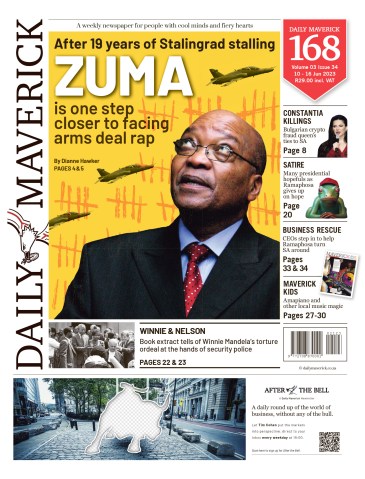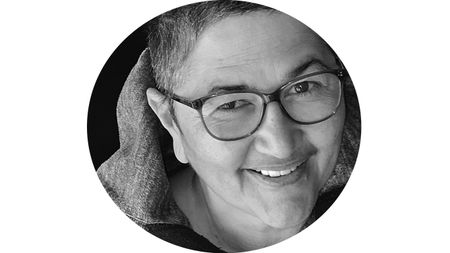Dear DM168 readers,
I have always lived in hope. My disposition is stupid and silly for some. Like Mr Cheeky nailed on the cross in Monty Python’s hilarious spoof on religion Life of Brian, I have an inordinate tendency to “always look on the bright side of life”, no matter how bad it gets, even if all the chips are down and horrible, devastating things have happened to me and/or my loved ones, my city, country or world.
I take the very long view on life. We humans have been here a while, swinging up and down, back and forth on the pendulum of evolution started by our pre-human ancestors around 6-7 million years ago. We are spring chickens, modern humans are around 200,000 years old.
Our human history has seen the rise and fall of civilisations, empires, kingdoms and cultures through wars, famine, droughts, volcanic eruptions and massive climate change.
Many of our ancestors put foot and left our common African home between 60,000 and 90,000 years ago, some scientists say to escape a drying climate. They went on to populate the Middle East, Europe, Asia, Euroasia and, finally, the Americas; learning, inventing and creating as they roamed the entire planet.
There are three reasons these scientific facts give me hope:
- The race laws of apartheid that defined and confined my childhood, and caused immense pain and damage to so many in our country, are exactly what my mother said they were. Nonsense. As she said. “No matter what colour your skin is, you are not inferior or superior to anyone.” Palaeontology teaches us that there is no black, white or yellow race. There is one race. Homo Sapiens. Us Humans.
- The long lens of history also teaches us that we are a creative, adaptive, resilient species. We have survived and thrived through learning from our environment and each other, through cooperation, sharing and trade, problem-solving and exploration.
- We humans have nowhere left to roam on our planet unless we’re stupidly rich and elite enough to board Elon Musk’s multibillion-dollar escape plan to Mars. (And most of us are not.) Since the mass migration out of Africa, we have populated every corner of Earth. If we learn from our past, we will know it is up to us to find a way of making what we have, where we live, work.
History and, sadly, often news churned out by my tribe, journalists, mostly record our evolution as a catalogue of crime and conquer. The hidden hands of those who have birthed, cared for and raised new generations, who have grown crops, domesticated and herded animals, loved, sang, drawn, made poems, sheltered, taught and healed are not as visible as are the criminals, conquerors and warriors.
We tend to magnify the times when we sacrifice our better selves and go to war, enslave, annihilate, exterminate, steal, rob and plunder. We don’t remember, write about and record for posterity the trillions of little things that most of us do every day to make life as humans worth living.
Without these little things —labours of love, kindness, care, cooking, talking, listening, picking up litter, apologising, forgiving, crying, laughing, being there for each other, looking after our children, turning up to do the work we need to or are paid to do — hope is a pipedream. A mirage on a potholed highway to nowhere special.
Hope does not need a hero. It does not need another messiah, a Jesus, a Prophet Muhammad, a Buddha or even another Nelson Mandela to save us or our country. Hope needs us. Each and every one of us. Doing the little things that make us get through another day. With integrity. Commitment. Competence. And if we fail, with the resilience to get up and try again. Differently.
In this week’s DM168, our team of journalists has smidgeons of hope lined up for you to soak up and reflect on.
Firstly, in our lead story, legal journalist Dianne Hawker explains how Jacob Zuma is one step closer to facing his Arms Deal rap after 19 years of legal loopholes. The court case Zuma lost this week was also very good news for journalists and whistle-blowers who people like Zuma and his ilk try to bully into silence. The judges found that Zuma’s private prosecution of Karyn Maughan “infringes on her right to freedom of expression, specifically, press freedom and the public’s right to receive such information. It has the effect of intimidating, harassing and silencing her as its ulterior motive...”
You will find another sliver of hope of sorts in our Business Maverick lead by Ray Mahlaka, which details how business leaders are going to step in and help the government tackle crime, the economic crisis and rolling blackouts. This week of slightly fewer rolling blackouts shows there is already some light at the end of this tunnel.
Then there is our regular series that shares solutions to youth unemployment. This week, Estelle Ellis spoke to a young Eastern Cape man who was despondent when he learnt he could not follow his dream of forensics because his matric marks were not good enough. We have to love his feisty grandmother who inspired him to try out agriculture. He now cultivates and sells more than 80,000 cabbages a year.
Both Estelle and I are avid backyard cabbage growers, so this story really warmed our hearts.
I hope our stories warm your hearts with hope too. Please share your thoughts with me at heather@dailymaverick.co.za
Yours in defence of truth,
Heather
This story first appeared in our weekly Daily Maverick 168 newspaper, which is available countrywide for R29.






 Former SA president Jacob Zuma at the Pietermaritzburg High Court on 22 March 2023. (Photo: Gallo Images / Darren Stewart)
Former SA president Jacob Zuma at the Pietermaritzburg High Court on 22 March 2023. (Photo: Gallo Images / Darren Stewart)